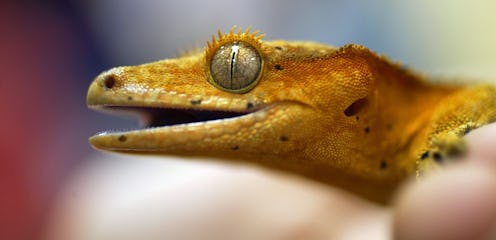News
Rest in Peace
If you're anything like me, this news may sour your day. Remember those geckos, the ones that Russia launched on a satellite for a month of outer space sexy-time? And how Russia lost control of the satellite, and there was nothing we could do but wait and pray for their safe return? Well, sad to say, sometimes the storybook ending doesn't come through. Although the satellite touched down in southern Russia today, as detailed by Wired, the Russian space sex geckos had died before its return.
The details are grisly — the geckos' bodies were discovered, according to The Guardian, in a "mummified" state, which suggests that they may have frozen to death while the satellite was outside of Russia's control. The date and nature of their deaths, be it due to mechanical failure or otherwise, will be "determined by specialists," according to Russia's space agency.
When the satellite, named Foton-M4, initially lost contact with Russia in July, concerns abounded that the automated systems necessary to keep the geckos alive might fail — Interfax reported that the geckos would have starved to death after two-and-a-half to three months with the satellite's life support disrupted. The satellite was ultimately only out of Russia's control for a few days, however, so what exactly transpired to kill the geckos is still unclear.
Fascination with the five hapless geckos — one male, and four female — grew in a big way after news of their peril initially broke back in July. If you're familiar with comedian John Oliver's HBO series Last Week Tonight, you may have heard of their plight there — Oliver marshaled a number of different celebrities, including Patrick Stewart and Julia Louis-Dreyfus, to record pleas to the Russian government to "go get those geckos." Oliver insisted that, amid months of awful news and depressing world events, humanity could start things off slowly and "build on the progress" of rescuing them.
On a personal note, I feel pretty sad about all this, and I think it has to do with knowing the geckos died in space, and for the cause of human research. Dying in outer space is a lonely and troubling concept, even if geckos lack that awareness — it's evocative of the Soviet space program of the 1950's and 1960's, which launched dogs into orbit to study the effects. While most of the dogs survived, a number of them didn't.
But if you're ever in the Los Angeles area, there's actually a truly unique exhibit in their memory — at the extremely odd Museum of Jurassic Technology, there's a wonderful gallery of oil portraits of the dogs, titled "The Lives of Perfect Creatures," keeping their legacy alive.
It's a beautiful and heartwarming concept, and it maybe shows a way forward for all of us to cope with the loss of these hero geckos — why should dogs be the only ones memorialized?
Maybe somebody somewhere could do something similar for these poor, slain geckos. A lovingly-crafted exhibit somewhere, recalling the time when we, as a nation and a world, hoped against hope for those space sex geckos to get home safe. In any case, rest in peace, guys.
Images: WochitGeneralNews/YouTube; John Nakamura Remy/Flickr
